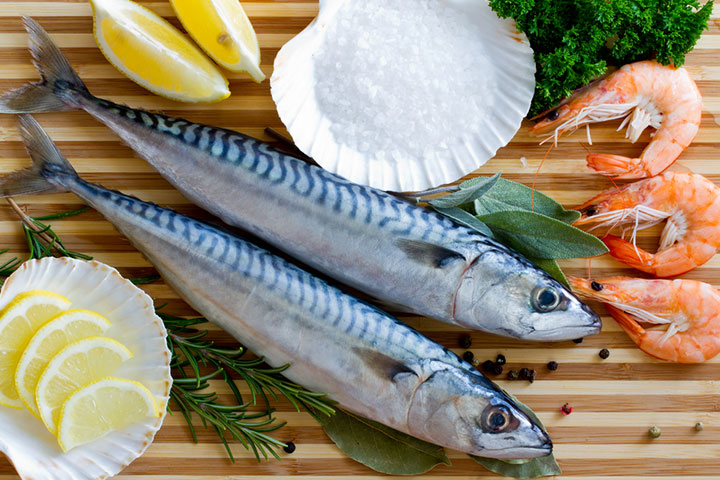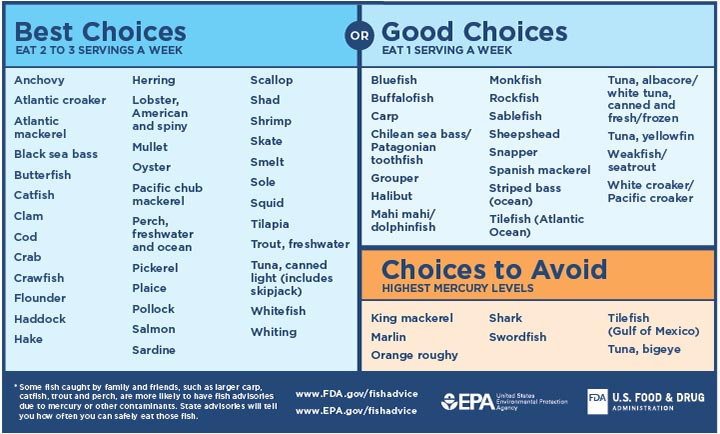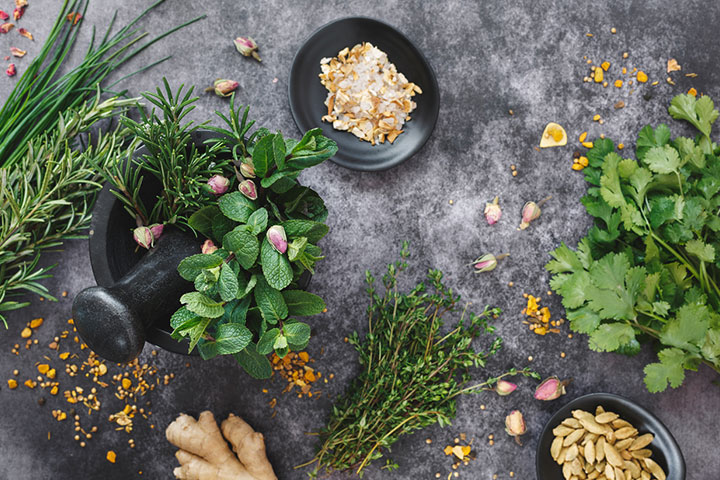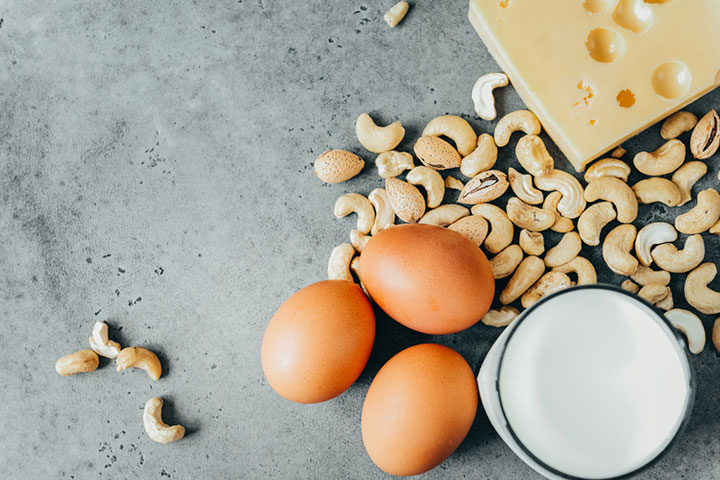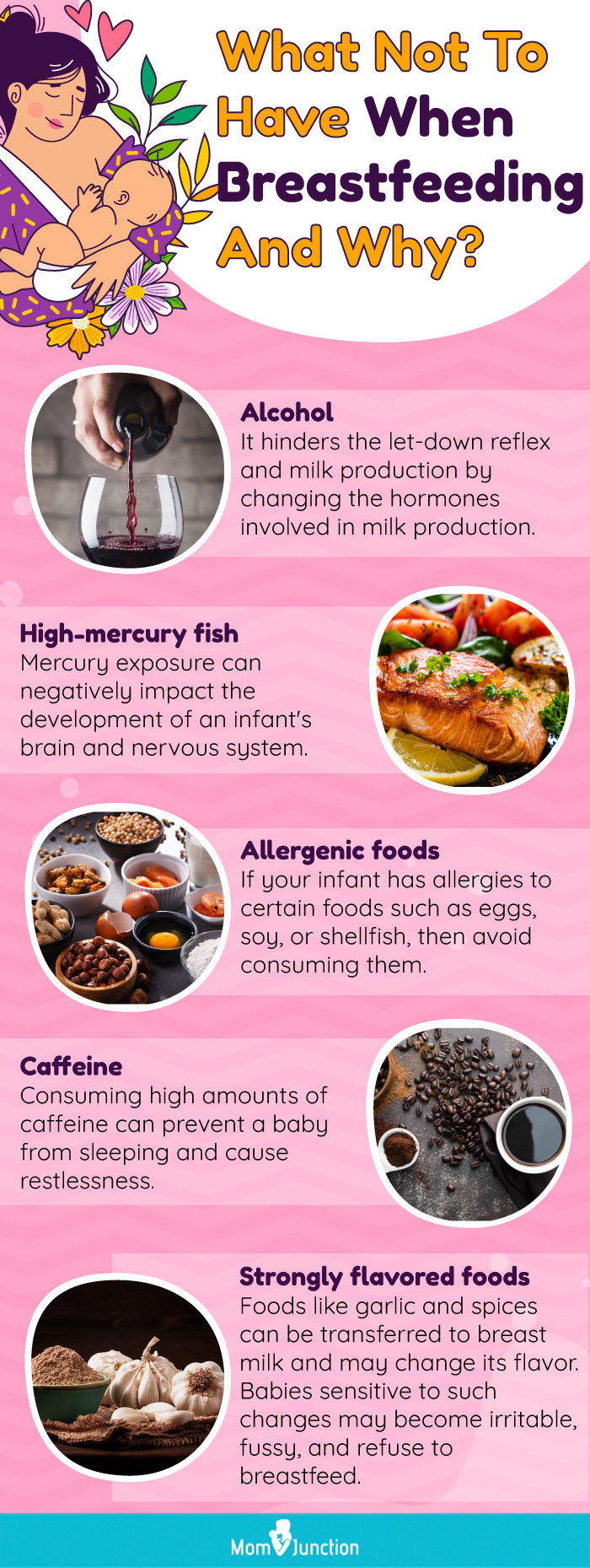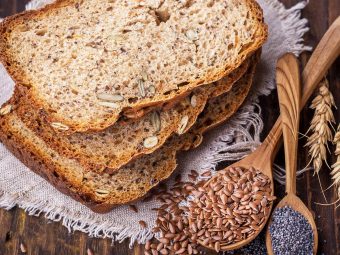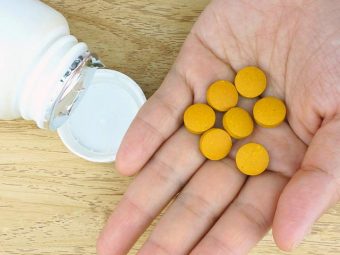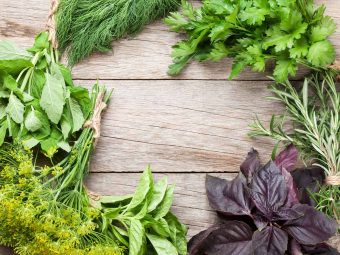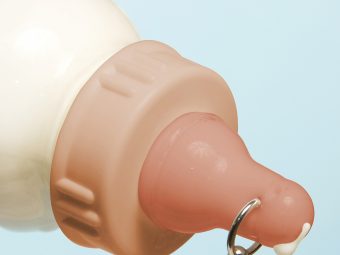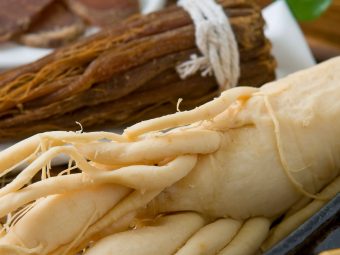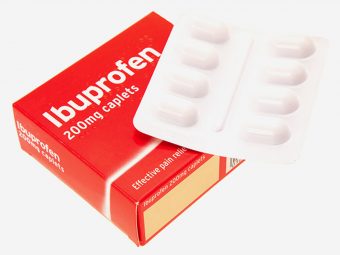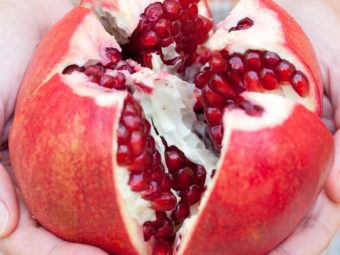
Image: Shutterstock
When nursing, you should consume a well-balanced diet comprising various healthy foods. However, you should also know about the foods to avoid when breastfeeding. According to the CDC, 83.2% of infants were reported to be breastfed at some point in time through their infancy. A healthy diet during nursing nourishes the mother and guarantees adequate lactation and nutrition to the infant.
Studies suggest that maternal nutritional conditions may have an impact on breast milk (1). Therefore, it’s important to know what foods and beverages you should restrict or avoid when nursing to ensure that nothing hazardous enters your baby’s system through breast milk.
Read on as we tell you which foods you should avoid or limit during breastfeeding.
Foods To Avoid Or Limit When Breastfeeding
1. Alcohol
Experts recommend avoiding alcohol during breastfeeding as it hampers the let-down reflex and milk production by altering milk-producing hormones (2). Also, it can disrupt the baby’s sleep, make them irritable, and cause long-term issues, such as impaired cognitive development (3). However, these concerns arise when a mother consumes a large quantity of alcohol frequently.
Experts recommend nursing mothers consume alcohol in moderation, i.e., no more than one standard drink a day (3). Consuming alcohol in moderation may not affect the infant, especially if a mother waits for at least two hours after a drink to breastfeed the baby.
Waiting for two hours after alcohol intake is crucial as 30 to 60 minutes after a drink, the alcohol level in the milk is at its peak, and it lingers in the milk for up to two to three hours. Although experts recommend one standard drink, you may wonder about its volume.
 Point to consider
Point to considerHow much is one standard drink?
The measure for one standard drink varies from one country to another. For instance, in the US, one standard drink (or one alcoholic drink equivalent) is:
- 12oz. of regular beer
- 5oz. of wine
- 1.5oz. of distilled spirits
Try to keep the intake occasional and within the limit. A breastfeeding mother consuming large quantities of alcohol could expose her baby to long-term health issues, such as delayed motor development (4). Consuming alcohol without food increases alcohol’s effect on milk-producing hormones. Therefore, ensure you always consume alcohol with a food item.
2. Caffeine
Caffeine is a natural stimulant commonly found in tea, coffee, and chocolate. Sports drinks, soft drinks, flavored water, energy drinks, and certain medications are some other products that may also contain caffeine. A nursing mother who eats or drinks a food/product containing caffeine can immediately pass this stimulant to her baby via breast milk (5).
Consumption of high amounts of caffeine can keep a baby awake and make them restless. However, a moderate intake is unlikely to cause any adverse effects in a healthy, full-term infant (6). Experts recommend nursing mothers consume no more than two to three cups of coffee (200 to 300mg of caffeine) per day (7). However, this recommendation may vary in some countries.
For instance, the NHS recommends nursing mothers limit their caffeine intake to less than 200mg per day (8). So consult your healthcare provider to decide a safe intake quantity for you.
 Be watchful
Be watchful3. High-mercury fish
Infants require several nutrients, such as lean protein and DHA (docosahexaenoic acid), for proper brain growth and development. Fish is a nutrient-rich food that can offer high-quality lean proteins and essential omega-3 fatty acids such as DHA and EPA (eicosapentaenoic acid). However, several fishes, such as bigeye tuna, swordfish, and mackerel, have high levels of mercury (9).
When a mother consumes high-mercury fishes repeatedly, it harms her and her breastfeeding baby. According to the Centers for Disease Control and Prevention (CDC), mercury can affect an infant’s brain and nervous system development (10). Impaired nervous system development could lead to other issues, such as impaired motor skills and delay in speech development (11).
Therefore, experts advise lactating women to consume low-mercury fishes, such as canned tuna (skipjack), salmon, and sardine. The Food and Drug Administration (FDA) advises lactating mothers to eat eight to 12 ounces (two to three servings) of low-mercury seafood per week (9).
Image: Food and Drug Administration
4. Highly processed food
Eating a well-balanced diet containing various fresh, healthy foods is vital. However, several moms choose processed foods as they are conveniently available and are ready to eat. Highly processed foods, canned foods, and fast food, such as fries and donuts, are generally high-sodium foods and possess trans fats, sugar, and total calories.
Consuming highly processed foods exposes an individual to health risks such as obesity, type-2 diabetes, hypertension, and cardiovascular issues (12). Besides, it could alter breast milk’s quality, potentially affecting a breastfeeding infant’s health.
A recent study from the Keck School of Medicine of USC showed that fructose sugar found in processed foods could pass to babies via breast milk. Exposing a baby to excess refined sugar during infancy and early childhood may alter a baby’s food choices, exposing them to long-term health risks (13).
5. Herbs
Herbs are aromatic plants that add flavor and aroma to a food. Besides, several of them are known to increase breast milk supply and treat certain breastfeeding problems, such as cracked nipples. Consuming herbs, especially as herbal supplements and teas, while breastfeeding requires caution due to the following reasons (14) (15).
- Herbs contain compounds that may have drug-like effects, passing into breast milk and affecting the baby.
- Clinical evidence corroborating several herbs’ safe and effective use in nursing mothers and infants is scarce.
- Herbal products may contain heavy metals and pesticides due to contamination.
Some herbs, such as arnica, seaweed, and St. John’s Wart, may adversely affect infants, and mothers should avoid them. A few other herbs that a mother should avoid due to their anti-lactogenic effects are peppermint, parsley, sage, jasmine, and chaste berry (16). If you wish to consume herbs during lactation, consult a lactation consultant or doctor first.
Below are some more foods that a nursing mother should avoid or limit.
6. Strongly flavored foods
Garlic, pickled foods, and spices, such as chili, are strongly flavored foods that can enter breast milk and may alter its taste (17). Babies sensitive to these changes may display irritability, fussiness, and reluctance to breastfeed.
A mother whose breastfeeding baby finds intensely flavored food in her diet irritating should consult a pediatrician or lactation consultant and discuss eliminating the food from the diet.
7. Allergenic foods
Cow milk, fish, peanuts, shellfish, tree nuts, wheat, soy and eggs, especially raw eggs are common allergenic foods. If your infant is allergic to any of these foods, you should avoid them (and their products) from your nursing diet.
Caitlin Houston, a mother of three daughters from Connecticut, writes in her blog, “All three of my daughters started showing symptoms of a dairy allergy at a very young age. Since my babies are exclusively breastfed, I do my best to avoid eating anything containing dairy ingredients. The baby’s dairy allergy symptoms include (but are not limited to) mucous in her stool, crazy newborn rashes, excessive spit-up, and painful gas (i).”
According to the American Academy of Pediatrics (AAP), two to three out of hundred exclusively breastfed infants show an allergic reaction to these foods, mostly cow’s milk, in the mother’s diet (18). In such instances, experts recommend eliminating milk and dairy products from the mother’s diet during the lactation phase.
 Experts say
Experts say8. Gassy foods
Foods such as cabbage, broccoli, beans, Brussels sprouts, and cauliflower are often labeled as ‘gassy foods’ due to the potential to cause gastric troubles when consumed in large amounts. As a result, breastfeeding mothers are typically cautioned about consuming these gassy foods. Although the fibers and gas produced by these foods do not impact breast milk (19), they may cause gastrointestinal discomfort in sensitive infants (18). Thus, consuming these foods in moderation is advisable to prevent excessive gas and distress, which could potentially interfere with infant care.
9. Artificial sweeteners
The intake of artificial sweeteners during breastfeeding can impact both breast milk and the infant. While certain sweeteners like aspartame have been found not to affect breast milk, others such as sorbitol and fructose have been associated with a higher risk of diarrhea and increased infant body weight. Therefore, it is advisable to either avoid or restrict the consumption of artificial sweeteners while nursing (20).
How To Know If Your Diet Is Affecting Your Baby?
Avoiding alcohol, high-mercury fishes, and highly processed food, and limiting caffeine is the best choice for every breastfeeding mom. However, avoiding flavored, gassy, or allergenic foods depends on whether these foods are affecting your baby or not.
If a baby is sensitive to flavored or gassy foods, they are likely to exhibit the following signs and symptoms (19).
- Abdominal discomfort
- Gassiness, bloating, or colicky behavior
- Extreme fussiness and irritability
- Persistent crying
- Refusing to breastfeed
A baby with food sensitivity or food allergy is likely to show the following signs.
- Abdominal discomfort
- Excessive gas
- Fussiness and irritability
- Nausea or vomiting
- Diarrhea or constipation
- Red itchy spots on the skin (hives) or eczema
- Wheezing and coughing
- Nasal congestion
- Bloody stools
- Difficulty breathing
- Anaphylaxis – a rare and severe allergic reaction warranting immediate medical intervention
If you suspect that particular food in your diet is causing discomfort to your baby, consult your pediatrician or lactation consultant and eliminate that food from your diet for the time being.
Frequently Asked Questions
1. What are the best foods to eat when breastfeeding?
Nursing mothers should consume a well-balanced, healthy diet containing foods from different food groups, such as whole grains, lean meat, veggies, fruits, nuts, and seeds. They should also focus on healthy fats, fiber, and their hydration levels. Eating a wholesome diet containing various foods can offer moms optimum nourishment to meet their increased nutritional needs during lactation (22) (23) (24).
2. What can I drink to increase breast milk?
Liquids such as water, soups, vegetable broths, fresh juices (with no added sugar or artificial sweeteners), and milk are some of the caffeine-free, healthy beverages that, when consumed with a well-balanced diet, may help you increase your breast milk supply (24).
3. Can I eat ice cream while breastfeeding?
Yes. You can eat ice cream when breastfeeding. However, keep the intake moderate as ice cream is often too high in calories, free sugar, and artificial additives that may affect your health.
The breastfeeding period is crucial for the development of the baby. Hence, you need to be wary of what you consume since it may pass on to your baby through your breast milk. Awareness about the foods to avoid while breastfeeding can help prevent adverse reactions in your baby. Therefore, look out for signs of discomfort such as continuous crying and fussiness or allergic reactions such as bloating and gas. Further, consult your healthcare provider to learn about the foods to avoid and include in your diet while breastfeeding.
Infographic: Foods To Avoid Or Limit When Breastfeeding
When breastfeeding, it is recommended to avoid foods that may cause discomfort for the baby or affect the quality of your breast milk. The following infographic contains a list of food items you should avoid when lactating. Avoiding them can ensure that your baby continues receiving the nourishment they need.
Illustration: Momjunction Design Team
Key Pointers
- Spicy foods and foods with intense flavors may alter breastmilk’s taste and cause issues in the baby while nursing.
- High-mercury fish, highly processed foods, alcohol, and certain herbs are best avoided during breastfeeding.
- Limiting caffeine intake and monitoring food sensitivities and allergic reactions in the baby is important.
- A healthy and nourishing dietary intake is crucial for the nursing mother to provide adequate nutrients to the baby.
- If the baby experiences severe or persistent reactions, it is advisable to consult a doctor or lactation consultant for better guidance.
Discover crucial insights on foods to steer clear of while breastfeeding in this eye-opening video. Learn from real experiences and gain expert advice to ensure your and your baby’s well-being.
Personal Experience: Source
MomJunction articles include first-hand experiences to provide you with better insights through real-life narratives. Here are the sources of personal accounts referenced in this article.
i. 5 tips for going on a dairy-free diet;https://caitlinhouston.medium.com/5-tips-for-going-on-a-dairy-free-diet-b87930fb99
References
1. Sheila M Innis;Impact of maternal diet on human milk composition and neurological development of infants; Oxford University Press
2. Alcohol; CDC
3. Drinking Alcohol and Breastfeeding; La Leche League International
4. Alcohol and breastfeeding; La Leche League GB
5. Caffeine; NCBI
6. Caffeine; La Leche League International
7. Maternal Diet; CDC
8. Breastfeeding and diet; NHS
9. Advice about Eating Fish; USFDA
10. Mercury; CDC
11. Mercury And The Developing Brain; Pew Trusts
12. The Many Health Risks of Processed Foods; Laborers’ Health & Safety Fund of North America
13. From mother to baby: ‘Secondhand sugars’ can pass through breast milk; USC
14. Herbal Medicines and Breastfeeding; The Royal Women’s Hospital
15. Is it safe for breastfeeding women to take herbal medicines?; NHS
16. Anne Eglash;Treatment of Maternal Hypergalactia; NCBI
17. Breastfeeding and a Mother’s Diet: Myths and Facts; La Leche League GB
18. Infant Allergies and Food Sensitivities; AAP
19. Goun Jeong, et al.; Maternal food restrictions during breastfeeding; NCBI







